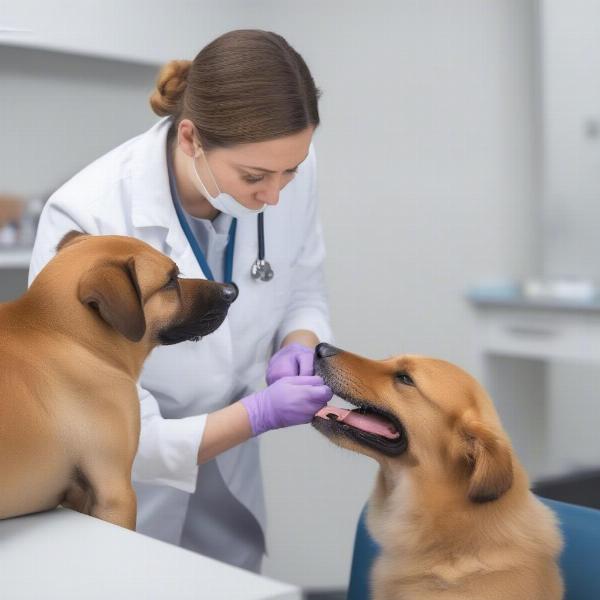Dog throatpie isn’t a recognized medical term in veterinary medicine. It’s likely a colloquialism or a misunderstanding. This guide will explore potential interpretations of “dog throatpie” and offer helpful information on related canine health issues, including throat and respiratory problems, dietary concerns, and behavioral patterns that might be mistaken for a specific condition.
 Dog Throat Examination
Dog Throat Examination
If you’re concerned about your dog’s throat or eating habits, it’s crucial to consult with a veterinarian. They can diagnose the actual problem and recommend appropriate treatment. Self-diagnosing and treating your dog can be dangerous and may worsen the underlying issue.
Could “Throatpie” Refer to Eating Habits?
One possible interpretation of “dog throatpie” could relate to a dog’s eating habits, particularly if they eat quickly or swallow food whole. This behavior can lead to choking, gagging, or regurgitation. It’s important to ensure your dog eats slowly and chews its food thoroughly. Puzzle feeders, slow-feed bowls, and smaller, more frequent meals can help address this issue.
What About Respiratory Issues?
“Throatpie” might also be used to describe sounds associated with respiratory problems. Kennel cough, canine influenza, and other respiratory infections can cause coughing, wheezing, and difficulty breathing. These conditions require veterinary attention, as they can be contagious and potentially serious.
Could It Be a Behavioral Issue?
Sometimes, behaviors like excessive licking, swallowing, or making unusual throat sounds can be related to anxiety or other behavioral issues. If your dog displays these behaviors, consult a veterinarian or a certified dog trainer to rule out medical causes and explore potential behavioral solutions.
Other Potential Throat Problems in Dogs
Several actual medical conditions can affect a dog’s throat, including:
- Tonsillitis: Inflammation of the tonsils, which can cause difficulty swallowing and decreased appetite.
- Laryngitis: Inflammation of the larynx (voice box), leading to a hoarse bark or loss of voice.
- Pharyngitis: Inflammation of the pharynx (throat), often caused by infection or irritation.
- Foreign bodies: Objects lodged in the throat, causing choking or breathing difficulties.
When to See a Veterinarian
If your dog exhibits any of the following symptoms, seek immediate veterinary attention:
- Difficulty breathing
- Coughing or gagging
- Loss of appetite
- Lethargy or weakness
- Excessive drooling
- Swelling in the throat area
- Changes in vocalization
Conclusion
While “dog throatpie” isn’t a medically recognized term, it likely points to concerns about a dog’s throat, eating habits, or respiratory system. By understanding potential interpretations and recognizing the signs of genuine medical conditions, you can ensure your furry friend receives the proper care and attention. Always consult a veterinarian if you’re worried about your dog’s health.
FAQ
- What should I do if my dog is choking? If your dog is choking, try to dislodge the object carefully. If unsuccessful, seek immediate veterinary assistance.
- How can I prevent my dog from eating too quickly? Use slow-feed bowls, puzzle feeders, or hand-feed smaller, more frequent meals.
- What are the signs of kennel cough? A persistent, hacking cough, often followed by a gagging sound.
- When should I take my dog to the vet for respiratory problems? If your dog shows any signs of labored breathing, coughing, or nasal discharge, consult a veterinarian.
- Can anxiety cause throat-related issues in dogs? Yes, anxiety can lead to excessive licking, swallowing, or other behaviors that may appear to be throat problems.
- What are some common throat problems in dogs? Tonsillitis, laryngitis, pharyngitis, and foreign bodies.
- How can I help my dog with a sore throat? Always consult a veterinarian for diagnosis and treatment recommendations.
Suggested further reading on ilmdog.com: (If applicable)
About ILM Dog:
ILM Dog is your trusted global resource for all things dog-related. We offer expert advice and practical information on dog breeds, health, training, nutrition, grooming, and much more. Whether you’re a new dog owner or a seasoned expert, we provide evidence-based guidance to help you care for your canine companion. For tailored support and recommendations regarding your dog’s specific needs, reach out to our team of experts. Contact us at [email protected] or call us at +44 20-3965-8624. Learn more about how ILM Dog can support your journey as a dog owner by visiting us at https://ilmdog.com.